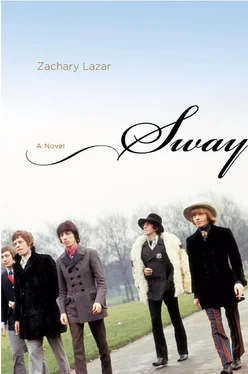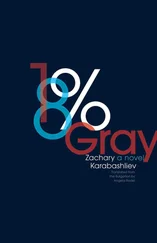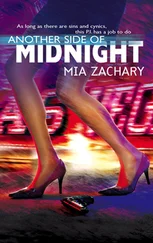“That’s how the cable cars work,” Anger explained one afternoon that fall, pointing out three enormous cogs connected to chains and engines, the city’s powerhouse. Bobby was standing in front of him in a brown leather overcoat, looking at the cogs, painted bright green, bright red, and bright yellow. He couldn’t help moving toward them — Anger could see from the way he’d forgotten his posture that he had never considered the cable cars, or the electric current that pulled them, or anything else about the city’s mysterious infrastructure.
He turned around then, hands in his front pockets so that his coat hung behind him like a cape. “I forgot to tell you,” he said. “There was a phone call the other night. I forget his name.”
Anger stared at him.
“The one who helped you direct the last film,” Bobby said. “In New York.”
Anger bowed his head, then raised it abjectly at the sky. He’d been waiting for a phone call from a film society in Germany, a potential source of funding, but now he knew who had called.
“Bruce Byron,” he said. “Was that his name?”
“That’s right. Bruce Byron. He wanted to talk to you about the next film. He said he has a new idea. Something about motorcycles.” He was looking at Anger through the orange lenses of his sunglasses, something almost accusatory in his gaze, as if he knew more about Bruce Byron than he was letting on. He seemed to be always surprising Anger with some disappointing news that he only pretended to not know was disappointing.
“I’m not speaking to him,” Anger said.
“You’re not speaking to him.”
“No, I’m serious. If he wants something, he can call my lawyer.”
Bobby nodded to himself, his head bowed. Lawyers — Anger could tell that that’s what he was thinking. They were absurd to him in the same way that Anger was absurd.
When they got home that afternoon, there was more news of Vietnam. The Vietcong had shelled Saigon: they were growing stronger, not weaker, and the war had spread from the jungle villages to the capital city. It was no longer something you could even pretend to ignore. It was, Anger realized, another reason for someone like Bobby to keep out of sight, to have no fixed address.
That night, they stayed up talking. Bobby was looking at the images on the bedroom walls, the gods and occult signs: the pentacle, the zodiac, the sephiroth with its Hebrew letters designating each of the ten emanations of God. Anger offered him a few explanations, casual and brief, but would not make it clear what was a game to him and what was serious. “You don’t need to know all that,” he said.
Bobby turned.
“You already know about it in some ways,” said Anger. “This is just part of the game.”
“What game?”
“Thinking that you don’t know what I’m talking about. That we have less in common than we do.” He sat down in a chair by the window and looked down at the floor. “I don’t want to talk about this,” he said. “It’s not going to be helpful. But I think you feel the same way. You’re here for yourself, not for me. I understand that. That’s one of the things we have in common.”
They smoked a joint. He watched Bobby go thoughtful and quiet, reclining in his chair, his fingertips touching, as the angular music made dim shapes in the air. He told Bobby a little bit about Bruce Byron then. He said that Bruce Byron was a kind of Frankenstein’s monster he had created by filming him in bad faith. He said that filmmaking could have real consequences, that it was more than just a game, that it could be like an act of aggression if director and actor didn’t understand each other deeply. He said that understanding each other had nothing to do with words, that words could be a hindrance to knowing another person. He said that New York had been a dead city and a dead culture and that was why he had come west, in search of fresh ideas. He didn’t mention the tin shed he’d lived in on the Gances’ roof, or the mix of arousal and scorn he’d felt in the presence of Bruce Byron’s body. He didn’t mention that on the night of Byron’s phone call he’d been in a dark basement off Castro Street, prostrating himself on the floor for five anonymous men. He knew that Bobby — this boy he’d cast as Lucifer — would see it only as an image of degradation. He didn’t try to explain how it had been transcendent in its brutality, how for a few moments it had reconfigured the surface of everything around him. Instead, he said that the point of art, like magick, was to undercut the rational mind, to remind us of how difficult it was to know what was real and what had merely been created to appear real.
He went into the kitchen and made some tea, bringing it back in two stained cups that he carried on a plate. As a way of changing the subject, he took out some photographs of Paris. He talked about his time there, about the artists he’d known. He talked about his former mentor, Jean Cocteau (dropping another name that Bobby had never heard), letting it all come gushing out, all that feminine talk.
Sometimes Byron would call, usually in the middle of the night, usually without saying a word. Anger would pick up the receiver to stop it ringing — Byron could wait for several minutes — and hear nothing but the faint static that conjured the distance between them, the miles of wire tense and responsive in the darkness.
He would see Byron’s face, unshaven, somehow off-kilter behind the large green sunglasses he had made him wear for all those bedroom scenes. I want it to be real. I’m the only one putting anything real into this. Every time it gets serious, you start smirking, playing your games.
In the bathroom, he would find Bobby’s jeans lying in a pile by the toilet. Through the cracked door of the extra bedroom, he would see the bare shoulders of the girl who moved slowly above him in the dark.
“I don’t really see where this is going,” Bobby said.
He was sitting naked on a wooden crate, cross-legged, raising his arms up in the darkness. With Anger’s watching presence invisible behind the camera — with the music on, the jagged meanderings of Sun Ra — Bobby had been stoned enough to enter into the role, aroused by his own nakedness, holding the pose, but now the moment was over and he was ashamed.
“The band is playing tomorrow,” he said, getting down off the crate. “Light show, everything. You could film that, help us out for once.”
Anger looked down at the camera. “I can’t always film the band, Bobby. You know that. It’s expensive.”
“Right.”
“I’m not going to talk about this anymore.”
“But that’s what it always comes down to, isn’t it? Money.”
“I don’t know what you think that means. Like I’m trying to rip you off or something.”
“There’s no script, no anything.”
“This is the script.”
“I’m making a bunch of gestures in front of a camera.”
“Why are you getting angry?”
“I’m just saying who has the money? That’s all I’m saying.”
He bent over to pull his pants on, clumsy on one foot, then the other. The strobe light was still on. It made everything hysterical, exaggerated, prolonged.
“I don’t have any money,” said Anger. “That’s the truth. It won’t change anything, getting angry.”
“I’m not getting angry. You’re always making more out of this than there is. The truth is I really don’t give a shit anymore.”
That December, Anger went on a business trip to New York. Scorpio Rising was having an almost permanent run there. He was going to meet an art dealer uptown, Robert Fraser, from London, who had sold some prints of Scorpio and Inauguration of the Pleasure Dome to a few of his private clients. Among them was a famous rock band. Anger had seen them before, but he had never paid much attention. While he was in New York that week, he saw a clip of them on TV. They were playing a song about a young man’s fantasies of blackness, a throbbing, hypnotic song with an Arabic melody played at first on an Indian sitar. It was more aggressive than any pop song Anger had ever heard. Like his own work, it was dark, but also shot through with exotic colors that had as little to do with darkness as a stained-glass window.
Читать дальше












